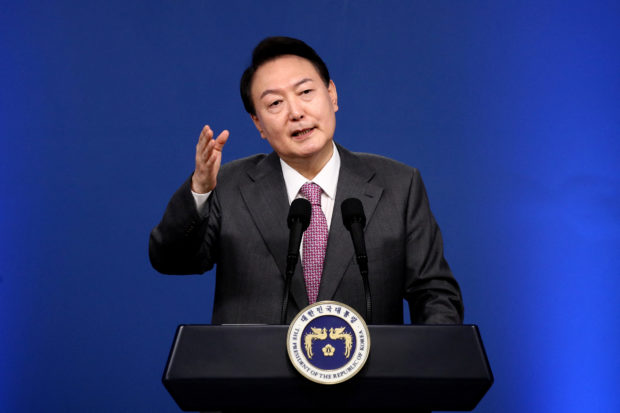SEOUL -The South Korean government may dial back the scale of tax cuts aimed at curbing inflation, as tax revenue for this year is likely to fall below estimates.
According to the Ministry of Economy and Finance, Korea’s tax revenue amounted to 54.2 trillion won ($41 billion) in the first two months of this year, marking a 15.7-trillion-won drop from the 69.9 trillion won recorded in the same period last year.
If the tax revenue from March to December is similar to the year before, the total tax revenue for 2023 will stand at 380.2 trillion won, lower than the government projection of 400.5 trillion won, making it difficult for the government to maintain the current tax cuts.
“The tax revenue is highly likely to fall below the original estimate,” Finance Minister Choo Kyung-ho said when visiting Samsung Electronics’ Pyeongtaek Campus on Friday.
“While the overall economy flow and capital market remain slow, businesses are recording lower earnings, making the tax revenue outlook gloomy,” he said.
The low tax revenue could lead to a disruption in state affairs, as related authorities will be unable to carry out their plans due to low budgets.
With worse-than-expected tax revenue, the government is considering ending tax extensions or cutting back on fuel tax reductions.
Fuel tax reductions, involving a 25 percent cut for gasoline and 37 percent cut for diesel and liquefied petroleum gas butane, are set to last until April. The tax cuts were enacted from November 2021 to temper a spike in international oil prices.
The cuts have led to a drop in related taxes worth 5.5 trillion won last year. As this year’s tax income budget was drawn up on the premise that the government maintains the fuel tax cut, it could secure more tax income by normalizing fuel taxes.
However, as international oil prices are going up following the oil production cut announcement from OPEC+ producers, the government is likely to adjust fuel tax reductions, bringing the current 37 percent cut for diesel down to 25 percent or making cuts for all fuel types down to 15-20 percent.
The Finance Ministry said Monday it has not made a decision on the running of fuel tax cuts after the current reduction scheme expires in April.
The cut on consumption tax on the purchase of passenger vehicles, aimed to encourage domestic consumption, is also a possible candidate for revision. The 30 percent cut is set to expire in June.
The tax cut began in July 2018 at 30 percent. It was brought up to 70 percent in early 2020 to boost the economy amid the COVID-19 pandemic and was eventually brought down to 30 percent in the second half of 2020. It has been extended every six months since then.
The government is likely to make a decision on the extension during the first half of this year.
Additionally, fair market price rates of comprehensive real estate holding tax could be adjusted.
Last year, the government brought down housing price rates to their lowest of 60 percent to lessen the burden for real estate taxes amid a plummeting real estate market. Due to the slump in the local housing market, however, official assessments of individual land prices fell and related tax revenues dropped.
While the government will have to make a decision on the comprehensive real estate holding tax during the first half of this year, it is considering bringing the rate back to the usual rate of 80 percent.
S. Korea to extend tax cut on passenger cars to boost consumption
S. Korea revises tax rules to respond to post-coronavirus economy
Read Next
Subscribe to INQUIRER PLUS to get access to The Philippine Daily Inquirer & other 70+ titles, share up to 5 gadgets, listen to the news, download as early as 4am & share articles on social media. Call 896 6000.
For feedback, complaints, or inquiries, contact us.
For all the latest Business News Click Here
For the latest news and updates, follow us on Google News.

